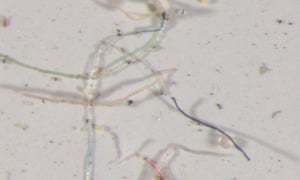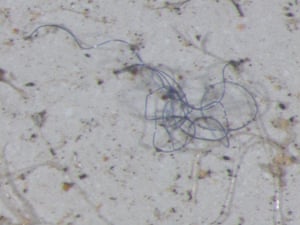Discovery raises new questions about the amount of plastic waste permeating the air, water, and soil virtually everywhere on Earth
Plastic was the furthest thing from Gregory Weatherbee’s mind when he began analyzing rainwater samples collected from the Rocky Mountains.“I guess I expected to see mostly soil and mineral particles,” said the US Geologic Survey researcher. Instead, he found multicolored microscopic plastic fibers.
The discovery, published in a recent study titled “It is raining plastic”, is raising new questions about the amount of plastic waste permeating the air, water, and soil virtually everywhere on Earth.
“I think the most important result that we can share with the American public is that there’s more plastic out there than meets the eye,” said Weatherbee. “It’s in the rain, it’s in the snow. It’s a part of our environment now.”
Rainwater samples collected across Colorado and analyzed under a microscope contained a rainbow of plastic fibers, as well as beads and shards. The findings shocked Weatherbee, who had been collecting the samples in order to study nitrogen pollution.

“My results are purely accidental,” he said, though they are consistent with another recent study that found microplastics in France’s Pyrenees Mountains, suggesting that plastic particles could travel with the wind for hundreds, if not thousands, of kilometers. Other studies have turned up microplastics in the deepest reaches of the ocean, in UK lakes and rivers and in US groundwater.
A major contributor is trash, said Sherri Mason, a microplastics researcher and sustainability coordinator at Penn State Behrend. More than 90% of plastic waste isn’t recycled, and as it slowly degrades it breaks into smaller and smaller pieces. “Plastic fibers also break off your clothes every time you wash them,” Mason said, and plastic particles are byproducts of a variety of industrial processes.
It’s impossible to trace the tiny pieces back to their sources, Mason said, but almost anything that’s made of plastic could be shedding particles into the atmosphere. “And then those particles get incorporated into water droplets when it rains,” she added, then wash into rivers, lakes, bays and oceans and filter into groundwater sources.
Though scientists have been studying plastic pollution in the ocean for more than a decade, they can only account for 1% of it. Researchers know even less about the amount of plastic in freshwater and in the air, said Stefan Krause at the University of Birmingham. “We haven’t really started quantifying it,” he said.
Another unknown is whether it would be theoretically possible to flush all plastic out of the natural world, and how long that might take. “Even if we waved a magic wand and stopped using plastic, it’s unclear how long plastic would continue to circulate through our rivers waters systems,” he said. “Based on what we do know about plastic found in deep sources of groundwater, and accumulated in rivers, I would guess centuries.”

Animals and humans consume microplastics via water and food, and we likely breathe in micro- and nanoplastic particles in the air, though scientists have yet to understand the health effects. Microplastics can also attract and attach to heavy metals like mercury and other hazardous chemicals, as well as toxic bacteria. “Plastic particles from furniture and carpets could contain flame retardants that are toxic to humans,” Krause said.
Because we are all are exposed to hundreds of synthetic chemicals as soon as we’re born, it’s difficult to say how much longer we’d live if we weren’t exposed, said Mason. “We may never understand all the linkages between plastics and health.”
“But we know enough to say that breathing plastic probably isn’t good, and we should start thinking about dramatically reducing our dependence on plastic,” she said.
As the crisis escalates…
… in our natural world, we refuse to turn away from the climate catastrophe and species extinction. For The Guardian, reporting on the environment is a priority. We give reporting on climate, nature and pollution the prominence it deserves, stories which often go unreported by others in the media. At this pivotal time for our species and our planet, we are determined to inform readers about threats, consequences and solutions based on scientific facts, not political prejudice or business interests.
More people are reading and supporting The Guardian’s independent, investigative journalism than ever before. And unlike many news organisations, we have chosen an approach that allows us to keep our journalism accessible to all, regardless of where they live or what they can afford. But we need your ongoing support to keep working as we do.
The Guardian will engage with the most critical issues of our time – from the escalating climate catastrophe to widespread inequality to the influence of big tech on our lives. At a time when factual information is a necessity, we believe that each of us, around the world, deserves access to accurate reporting with integrity at its heart.
Our editorial independence means we set our own agenda and voice our own opinions. Guardian journalism is free from commercial and political bias and not influenced by billionaire owners or shareholders. This means we can give a voice to those less heard, explore where others turn away, and rigorously challenge those in power.
We need your support to keep delivering quality journalism, to maintain our openness and to protect our precious independence. Every reader contribution, big or small, is so valuable. Support The Guardian from as little as $1 – and it only takes a minute. Thank you.
